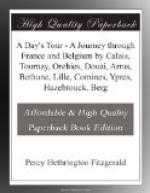+------+ | AD | | 1770 | +------+
In later years it did not flourish much, but gently decayed. Everything seemed in a state of mild sleepy abandonment and decay till about the year 1861, when the Desseins gave over business. The town, much straitened for room, and cramped within its fortifications, had long been casting hungry eyes on this spacious area. Strange to say, even in the prosaic pages of our own ‘Bradshaw,’ the epitaph of ’old Dessein’s’ is to be read among its advertisements:
’CALAIS.
’HOTEL DESSEIN.—L. Dessein, the proprietor, has the honour to inform his numerous patrons, and travellers in general, that after the 1st of January his establishment will be transferred to the Hotel Quillacq, which has been entirely done up, and will take the name of HOTEL DESSEIN. The premises of the old Hotel Dessein having been purchased by the town of Calais, it ceases to be an Hotel for Travellers.’
Still, in this new function it was ‘old Dessein’s,’ and you were shown ‘Sterne’s room,’ etc. I recall wandering through it of a holiday, surveying the usual museum specimens—the old stones, invariable spear-heads, stuffed animals; in short, the usual rather heterogeneous collection, made up of ‘voluntary contributions,’ prompted half by the vanity of the donor and half by his indifference to the objects presented. We had not, indeed, the ‘old pump’ or the parish stocks, as at Little Pedlington, but there were things as interesting. Here were a few old pictures given by the Government, and labelled in writing; the car of Blanchard’s balloon, and a cutting from a newspaper describing his arrival; portraits of the ‘Citizen King’ in his white trousers; ditto of Napoleon III., name pasted over; the flagstone, with an inscription, celebrating the landing of Louis XVIII., removed from the pier—in deference to Republican sensitiveness—no doubt to be restored again in deference to monarchical feelings; and, of course, a number of the usual uninteresting cases containing white cards, and much cotton, pins, and insects, stuffed birds, and symmetrically-arranged dried specimens, the invariable Indian gourds, and arrows, and moccasins, which ’no gentlemanly collection should be without.’ Never, during




